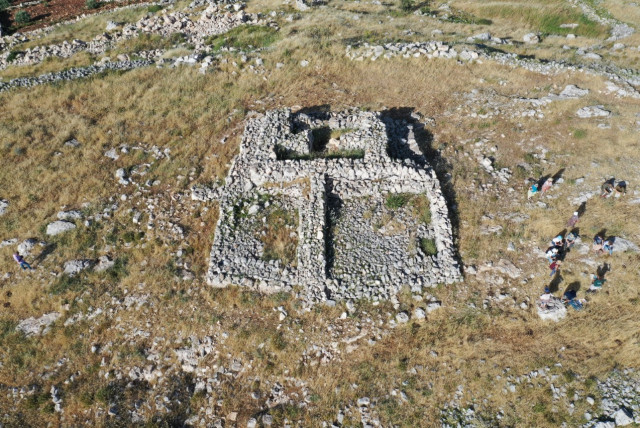Caroline Glick: When Cultural Appropriation and Historical Revisionism Are Acts of War
Two weeks ago, a bus filled with veteran Israeli generals from the Bithonistim, a grassroots national security organization, slowly made its way up the slopes of Mt. Ebal in Northern Samaria to visit a biblical-era site that was severely damaged by a Palestinian Authority contractor in late January.Guardian op-ed promotes the end of the Jewish state
They came to draw the public's attention to the strategic implications of the war the Palestinians are waging against Jewish history.
The site was excavated between 1980 and 1989 by the late Professor Adam Zertal, who identified it as Joshua's Altar as described in the Books of Deuteronomy, (27; 1-9) and Joshua (8; 30-35). The animal remains at the site contained thousands of burnt bones of year-old male, exclusively kosher, animals. They were burned in an open flame 3,250 years ago—the time generally identified as the period of ancient Jewish settlement of the Land of Israel under Joshua. Other remains found at the site included earrings and scarabs made in Egypt at the time of Ramses II, the Egyptian pharaoh often associated with the story of the Exodus from Egypt.
As Zertal explained in a lecture in 2013, the altar was buried under a layer of rocks, in keeping with Jewish prescriptions for preventing the desecration of abandoned holy sites. In keeping with the biblical narrative, the altar is made of unhewn stones; instead of steps, there are two ramps for the priests to alight to the platform—blocks of plaster were found nearby. The altar at Mt. Ebal also matches a Talmudic description of an altar from the Second Temple period, around 900 years later, indicating a continuity of Jewish practices throughout the biblical period.
Although initially controversial, Zertal's general finding that the site is around 3,300 years old and is a Jewish historical site, where sacrifices were carried out in keeping with biblical guidelines, has become widely accepted—although many continue to dispute the specific identification with Joshua.
In late January, the Palestinian Authority (PA) posted a video on its website of 60 meters of the ancient wall surrounding the altar being destroyed to pave a road connecting the Palestinian village of Asira ash-Shamaliya to Nablus. Nablus, built on the ruins of the biblical city of Shechem, is located in northern Samaria between Mt. Ebal and Mt. Gerizim.
Zertal was a fiercely secular son of hardcore socialists. Yet, he explained in a 2013 lecture, his scientific work compelled him to accept that the biblical narrative "from Deuteronomy through the Books of Kings was historically accurate."
"There are people who refuse to acknowledge that the damage done here was deliberate," Major General Gershon Hacohen explained to Newsweek. "That since it was the surrounding wall—rather than the altar itself—that was destroyed, the altar wasn't harmed. That's like saying that if someone destroys the steps to the Acropolis, they aren't harming the Acropolis. It's the same complex."
"They also say the Palestinians weren't trying to damage the site—they just needed stones for their road. But look at this place," he said and waved his hand across the landscape.
The slopes of Mt. Ebal are strewn with loose rocks.
"If they needed rocks for the road, all the Palestinians had to do was bring up a truck and take as many as they needed. Instead, they brought a bulldozer all the way up here and deliberately destroyed 60 meters of a 3,250-year-old wall."
As if to prove Hacohen's point, this week, a group of Palestinians was filmed barbecuing on the altar itself.
The Palestinian effort to destroy the site is of a piece with the PA's long-standing efforts to destroy the physical record of millennia-old Jewish settlement in the Land of Israel. That effort is now focused on destroying and appropriating the artifacts of Jewish history in Samaria.
For the second time in as many months, the Guardian has published an op-ed calling for an end to the Jewish state. The latest piece, (“The Israeli and Palestinian elections offend democracy – each in their own way”, March 18) by Salem Barahmeh, director of the Palestine Institute for Public Diplomacy, parrots the narrative of B’tselem in claiming that Israel isn’t truly democratic.The Quincy Institute vs. John Quincy Adams
In January, Btselem’s director Hagai El-Ad penned a Guardian op-ed (based on his group’s report) which included the lie that Israel is a non-democratic “Jewish supremacist” state which “rules everyone and everything between the river and the sea” – propaganda we refuted at the time.
Similarly, Barahmeh’s op-ed includes the following:
Israel’s famed “democracy”, like its expansionist policies, doesn’t stop at or recognise the green line – if anything it has bulldozed them into oblivion. In practice, Israel effectively exercises total control over the land between the Jordan River and the Mediterranean Sea.
He’s arguing, much like El-Ad before him, that Israel has “total control” not only over Palestinians in PA-controlled Area A of the West Bank, but, even more absurdly, that Jerusalem has “total control” over the two million Gazans who live under Hamas’s authoritarian rule.
Barahmeh then peddles more untruths:
5 million Palestinians vote for the PA, an administrative body that today has only partial control over 40% of the West Bank and is dependent on Israel for its survival. The PA was supposed to exist for five years while Palestinians transitioned to statehood, but that state never came. Successive Israeli governments made sure of that, using settlements and annexation to turn the West Bank, Gaza and Jerusalem into an archipelago of disconnected Palestinian population centres.
In fact, the PA has both military and administrative control of Area A, where the overwhelming majority of West Bank Palestinians live. Further, contrary to Barahmeh’s claim, there was no such promise that, five years into Oslo, a Palestinian state would be born – a myth about the Accords that we’ve gotten corrected at other publications.
Finally, his suggestion that “Israeli settlements and annexation” have turned the West Bank, Gaza and Jerusalem into “an archipelago of disconnected population centres” is ahistorical. Since as far back as 1949, when Jordan controlled the West Bank and Egypt controlled Gaza, the two Palestinian population centres were “disconnected”. Contrary to myths spread by pro-Palestinian activists, there never was, at any time in history, a sovereign, unified, uniquely Palestinian polity between the river and the sea.
n the fall of 2019, a group of historians and foreign-policy scholars founded the Quincy Institute for Responsible Statecraft. Featuring thinkers such as Andrew Bacevich and Stephen Wertheim and funded by the unlikely duo of Charles Koch and George Soros, the organization named after John Quincy Adams calls for a restrained, noninterventionist U.S. foreign policy. Its stated mission is to “set U.S. foreign policy on a sensible and humane footing” based on “diplomatic engagement and military restraint.” Its mantra is Adams’s pithy quotation that America “goes not abroad in search of monsters to destroy,” which Bacevich contends “has discomfited proponents of militarized liberation or benign hegemony or empire gussied up as social uplift ever since.”
According to documents published on its website, the Quincy Institute wants to “reduce U.S. military operations in the Taiwan Strait,” concede Chinese military dominance in the South China Sea, “significantly withdraw troops” from the Middle East, offer Iran billions of dollars of IMF loans “to fight the coronavirus pandemic,” slash American commitments to NATO, and reduce the military budget.
The recommendations on the Middle East and Iran are of particular note. For among the Quincy Institute’s coterie of experts are numerous figures who have been publicly antagonistic toward Israel and America’s close relations with the Jewish state. These include Lawrence Wilkerson, a bitter critic of “the Jewish lobby in America”; the indefatigable investigators of American Jews’ dual loyalties, Paul Pillar and Chas Freeman; and leading “Israel Lobby” conspiracy authors John Mearsheimer and Stephen Walt.
Bear in mind, the institute is named after a man who in 1825 endorsed “the rebuilding of Judea as an independent nation.” That the anti-Zionist scholars of the Quincy Institute are at odds here with their organization’s namesake is not surprising. In fact, they misunderstand John Quincy Adams’s foreign-policy thinking in general. Bacevich laments, “During the 20th century, particularly its latter half, Americans abandoned the precepts that had guided policy makers back in Adams’s day…. Meddling—always in a worthy cause, of course—became fashionable.” To him, “Adams’s singular achievement, articulated in the Monroe Doctrine, was to position the United States for hemispheric hegemony, while still heeding Washington’s dictum to avoid ‘interweaving our destiny with that of any part of Europe.’” He has also praised Adams for “avoiding unnecessary trouble” and continuing an American grand strategy that “emphasized opportunistically ruthless expansionism on this continent, avid commercial engagement, and the avoidance of great-power rivalries abroad.” Wertheim adds that Adams “came to strongly oppose U.S. expansionism in the 1840s and 50s.”
















 Intergalactic Standard Date 14.5.99.008, in orbit around Earth - Captain, our surface team has returned from the planet with several specimens upon which to conduct our experiments, including at least three of the fascinating "Anti-Zionist" subspecies of human, but our laboratory crew are reporting some trouble determining which is the anterior and which is the posterior, and those specimens have yet to undergo the anal probing as a result.
Intergalactic Standard Date 14.5.99.008, in orbit around Earth - Captain, our surface team has returned from the planet with several specimens upon which to conduct our experiments, including at least three of the fascinating "Anti-Zionist" subspecies of human, but our laboratory crew are reporting some trouble determining which is the anterior and which is the posterior, and those specimens have yet to undergo the anal probing as a result.



























